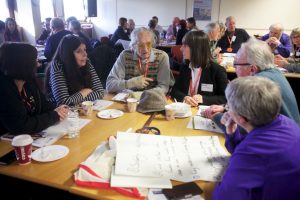A watchdog’s decision to question the Department for Work and Pensions (DWP) about the information it holds on benefit-related suicides could be a long-awaited recognition of the damage caused by the government’s policies, say disabled activists.
They spoke out after the National Audit Office (NAO) confirmed that it would seek information from DWP about what records it holds on suicides linked by coroners to its actions.
The watchdog decided to act after Justin Tomlinson, the minister for disabled people, claimed in a parliamentary answer that it would be too expensive to produce such information.
Tomlinson was asked about the figures last month by Frank Field, the independent MP who chairs the Commons work and pensions select committee.
He had asked Tomlinson how many times since 2013 DWP had submitted evidence to inquests into the deaths of benefits claimants who had taken their own lives, and how many of the coroners holding those inquests had ruled that DWP policies were partly responsible for the suicide.
Field raised concerns about Tomlinson’s answer with NAO.
Now Gareth Davies, NAO’s auditor general, has told Field in a letter – seen by DNS – that it is a “very important and serious topic” and that he will ask DWP about the information it holds.
Davies also suggested that NAO might decide to compile the information itself, depending on how DWP responds to his questions.
The decision to question DWP about benefit-related suicides has been welcomed by disabled activists, despite concerns that much more needs to be done to uncover the actual number of deaths caused by the actions of DWP ministers and officials over the last decade.
Less than two years ago, Field’s committee refused to put questions to the then minister for disabled people, Sarah Newton, about figures that showed attempted suicides among people claiming out-of-work disability benefits had doubled between 2007 and 2014.
The figures, which showed how the proportion of claimants reporting a suicide attempt rose sharply after the introduction of employment and support allowance (ESA) and the work capability assessment (WCA) – although the figures did not prove a link to the WCA – had been passed to the committee by Disability News Service (DNS) in advance of an evidence session with Newton.
Field’s committee also refused to comment in May this year when DNS secured proof that DWP had failed to pass crucial documents linking the assessment with suicides and other deaths to its own independent reviewer of the WCA.
Years of research have shown clear links between the government’s social security reforms and suicides.
Four years ago, public health experts from the Universities of Liverpool and Oxford showed in a study that, across England as a whole, the process of reassessing people on incapacity benefit for the new ESA between 2010 and 2013 was “associated with” an extra 590 suicides.
A petition calling for an independent inquiry into deaths linked to the actions of DWP, and for any evidence of misconduct by ministers and civil servants to be passed to the police for a possible criminal investigation, secured more than 55,000 signatures by the time it closed last month.
The Justice for Jodey Whiting petition secured almost no support from large disability charities like Leonard Cheshire, RNIB, Scope and Sense, but was backed by grassroots organisations of disabled people and the families of disabled people whose deaths have been linked to DWP’s actions.
Rick Burgess, from Manchester Disabled People Against Cuts, said: “Anecdotally we all know of deaths that would not have happened if it weren’t for the DWP.
“It is hard to quantify with precision and this exercise will likely undercut the true total due to a reluctance of state authorities to accuse other organs of the state of unlawful killing.
“Perhaps an epidemiological approach could discover the true scale of harm caused.”
But he added: “What I would hope this signifies is a recognition that the DWP’s hostile policies towards disabled people have caused immense suffering, deaths, and human rights abuses, and that this has to be stopped and then accounted for through a truth and reconciliation process, that will inevitably include prosecutions of key government personnel.”
John McArdle, co-founder of Black Triangle, welcomed NAO’s decision to examine the figures held by DWP.
He said: “Black Triangle welcomes Mr Field’s activism on this issue which we have been campaigning on for so long.
“It has come not a moment too soon.”
But he said it came in the wake of the “disappointing” failure of the Justice for Jodey Whiting petition to secure the 100,000 signatures necessary for a parliamentary debate.
He added: “Families are crying out for justice. Really the police and the Crown Prosecution Service should be looking at this.
“We believe there is sufficient evidence that would give rise to the prosecution of DWP ministers and officials for misconduct in public office and possibly other offences.”
Field was not available to comment this week on why he had changed his mind on probing DWP on the issue of deaths linked to the government’s social security reforms.
But he said in a statement issued earlier this week, and passed to DNS by his office, that he had asked the question in parliament after a constituent took his own life when his personal independence payment was withdrawn.
Field said: “I struggle to believe that, given the amount of time it must take to put together evidence for inquests, attend court hearings, and internally review the decisions to see what part the DWP policy may have played in a claimant taking their own life, there is no record of such.
“It shocks me even more that the department is apparently unconcerned with the most drastic effects of its policies and conducts no internal monitoring of the tragedies in which it could be complicit.”
He added: “Amongst many other things, I hope the NAO will, through these initial enquiries, find out the cost the DWP will incur to answer this parliamentary question, as it would be most helpful to understand what expense the department considered out of proportion to the infinite preciousness of the human lives it is supposed to serve and protect.”
A DWP spokesperson said: “The NAO has been clear that they have not opened an inquiry into this and has made no commitment to opening one in the future.
“They are interested in the information we hold.
“The death of a claimant is always a tragedy and whilst this is not an inquiry, the NAO rightly considers it an important topic which we will engage with them on.”
An NAO spokesperson said: “We can confirm that we have received correspondence raising concerns about a reply by the Department for Work and Pensions to a written parliamentary question relating to inquests of benefits claimants who ended their lives by suicide.
“We are engaging with the DWP about the information it holds on this issue and will reply to the correspondent with our findings in due course.”
Samaritans can be contacted free, 24 hours a day, 365 days a year, by calling 116 123 or emailing jo@samaritans.org
24 October 2019. News provided by John Pring at www.disabilitynewsservice.com


